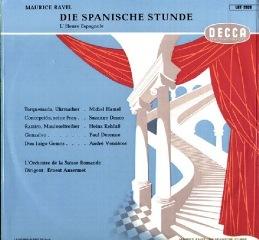Maurice Ravel - L’Heure Espagnole (1953)
Maurice Ravel - L’Heure Espagnole (1953)

Part 1 01. Introduction, 02. Señor Torquemada, horloger de Tolède (Scène I), 03. "Totor!" (Scène II), 04. Il reste, voilà bien ma chance! (Scène III), 05. "Il était temps, voici Gonzalve!" (Scène IV), 06. "C'est fait, l'horloge est à sa place" (Scène V), 07. "Maintenant pas de temps à perdre!" (Scène VI), 08. Salut à la belle horlogère! (Scenes VII) 16:26:20 Part 2 09. "Voilà! ... Et maintenant à l'autre!" (Scène VIII), 10. "Evidemment, elle me congédie" (Scène IX), 11. "Voilà ce que j'appelle une femme charmante" (Scène X), 12. Monsieur! ah! Monsieur! (Scenes XI), 13. "Enfin, il part!" (Scène XII), 14. "Voilà l'objet!" (Scène XIII), 15. "Ah! vous, n'est-ce pas, preste! leste!" (Scène XIV), 16. "En dépit de cette inhumaine" (Scène XV), 17. "Voilà ce que j'appelle une femme charmante"(Scène XVI), 18. Oh! la pitoyable aventure! (Scène XVII) 17:22:65 Part 3 19. Voilà! ... Et maintenant, Senora, je suis prêt (Scène XVIII), 20. "Mon oeil anxieux interroge" (Scène XIX), 21. Adieu, cellule, adieu, donjon!, 22. Il n'est pour l'horloger (Scenes XX), 23. "Pardieu, déménageur, vous venez à propos!" (Scène XXI), 24. Un financier ... et un poète... 11:54:20 Suzanne Danco (Concepción, soprano), Paul Derenne (Gonsalve, ténor), Michel Hamel (Torquemada, ténor), Heinz Rehfuss (Ramiro, baryton), André Vessieres (Don Iñigo Gomez, basse) Orchestre de la Suisse Romande Ernest Ansermet - conductor Genève, Victoria-Hall, 19.05.-01.06.53
Ravel's opera L'heure espagnole, completed in 1909, was his first work for the stage, and it richly exhibits the irony and refined humor that graced his Histoires naturelles. The vehicle for Ravel's sophisticated, convoluted humor is the quasi-parlando vocal line, a singing technique that combines elements of speech; not only is the effect a bit unreal, but the technique enables the composer to literally blend speech and music, often using purely musical effects to emphasize the narrative's comic point. Based on a play by Franc Nohain, L'heure espagnole is a parodic improvisation on the paradoxical and mysterious nature of time. Taking place in a watchmaker's shop, the story centers on his wife's grotesquely transparent ploys to get her husband out of the way so she can pursue a series of amorous trysts. In calling his opera The Spanish Hour, Ravel openly ridicules the perennial complaint of lovers whose time always seems to flow faster. Ravel only sees this hour as a framework to contain -- if possible -- a torrent of ridiculous events. Obviously, even time itself is ridiculous. The characters' names, too, are comical: the foolish watchmaker is called Torquemada (a grotesque reference to the cruel Torquemada of Spanish Inquisition "fame"). So, while Torquemada is away fixing clocks, his wife entertains her paramours. When Torquemada returns, the other characters hide in clocks or pretend to be customers. The burlesque climax of the opera is an amazing quintet of all of the characters poking fun at each other. In this work, Ravel indulges a fascination with mechanical devices that he inherited from his Swiss father, who was an engineer. L'heure espagnole opens with an introduction, a masterfully suggestive evocation of a hallucinatory world of ticking clocks and human-like automatons. Another fascination is Spain. Claiming Basque heritage, Ravel often turned to Spain for inspiration. But Ravel's Spain is an idealized, stylized realm, an imaginary world that only vaguely resembles the physical place. Thus, Ravel's Spanish, which sounds vaguely Hispanic, has no other source than Ravel's mind. And in this work, like in other Spanish compositions, Ravel revels in his prodigious talents as a colorist, using a variety of brass and percussion instruments to create the richly atmospheric background of the ridiculous and often frantic events. The opera concludes with a Habanera; true, the rhythms are Spanish, but the essence of this concluding dance, with its bright energy and vaguely modal melodic lines, brings the fantastic Spain of Ravel's imagination to brilliant life. --- Zoran Minderovic, Rovi
download: uploaded yandex 4shared mediafire solidfiles mega filecloudio nornar anonfiles ziddu
Last Updated (Wednesday, 02 April 2014 13:38)








